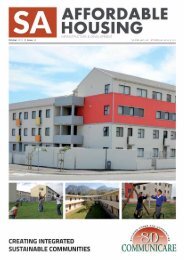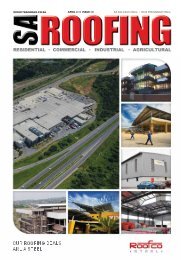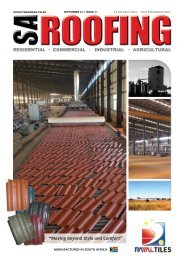InfrAstructure & Development - Trademax Publications
InfrAstructure & Development - Trademax Publications
InfrAstructure & Development - Trademax Publications
Create successful ePaper yourself
Turn your PDF publications into a flip-book with our unique Google optimized e-Paper software.
Finance<br />
“The first step must be to prevent further backlogs and the<br />
spread of informal and squatter areas,” she says. “This is<br />
far from where we are now. We have to think of measures<br />
we have to instate to get massive housing going for at<br />
least 70% of the population.”<br />
To do this, Hoek-Smit says innovative housing products<br />
that take the local social, economic and institutional<br />
contexts into account and that are also sound from a<br />
business funding, operational and risk management<br />
perspective must be developed.<br />
“The focus is on getting the private and public sectors to<br />
create as much new housing as possible to house new<br />
household formation,” she says. “And this cannot be done<br />
by only building in the upper, upper-middle income levels<br />
in the hopes that housing will filter down to low income<br />
levels.”<br />
For this to happen, Hoek-Smit says, there is a need for<br />
finance at many different levels. Her main focus in her<br />
work at St. Catherine’s College is to understand the work<br />
and need of equity investors and how they may be enticed<br />
to come into investing in African housing; to look at those<br />
institutions that provide construction debt loans to<br />
developers and what they require to go to scale and<br />
minimise risk; to consider rental housing – an area nonexistent<br />
in Africa presently, looking at who is going to<br />
provide rental investors with rental debt, longer term<br />
debt, and not just construction debt; and then<br />
understanding how mortgage lending can be expanded<br />
rapidly to ensure that developers have the clients that<br />
have the mortgage to buy the developed stock.<br />
According to Kecia Rust, coordinator of FinMark Trust’s<br />
Centre for Affordable Housing Finance in Africa, the<br />
mortgage market in Africa is tiny but that means there is a<br />
lot of space for growth. The African <strong>Development</strong> Bank<br />
also estimates that 20% of the African population earns<br />
more than $20 a day, which is promising if mortgage<br />
systems become sufficiently sophisticated to make it more<br />
affordable for Africans to own their own home.<br />
Rust says that one very interesting option emerging in<br />
Africa is housing microfinance.<br />
“We work closely with micro-lenders to see how we can<br />
expand their scope so that we can have finance for low<br />
income folk,” she says. “There is a need for noncollateralised<br />
loans from a variety of schemes to give<br />
people that do not have the steady income, employment<br />
security, and tenure security needed to secure a loan in<br />
the mortgage market to access finance for incremental<br />
building and home-improvement.”<br />
She says that micro-lenders are increasingly coming to<br />
market, but there needs to be regulatory support to take<br />
their investments to scale.<br />
“The really important thing here is that we need cheaper<br />
houses, and we need government, lenders and developers<br />
to start having the necessary conversations across the<br />
continent to find a way to build cheaper houses in a<br />
sustainable way.”<br />
Rust says that there is a major need for people in private<br />
housing finance institutions, government finance and<br />
housing agencies, academic and international<br />
development institutions from both emerging markets and<br />
established economies to understand all the key issues<br />
and concepts in housing finance with respect to different<br />
contexts, the design of different housing products<br />
available and the business models needed to provide such<br />
products effectively and sustainably.<br />
“We need to help people in this sector understand the full<br />
implications of the innovation taking place in housing<br />
finance, and provide them with the insight needed to<br />
ensure that creative and sustainable solutions are<br />
implemented perfectly in the Sub-Saharan African<br />
context,” says Hoek-Smit. “If the system is to be<br />
sophisticated enough to eradicate housing problems, then<br />
everyone involved, from lenders to developers and even<br />
sales, need to be on the same page.”<br />
Affordable housing is more than just providing a basic<br />
need to the poor, it is about creating a sustainable society<br />
that nurtures the growth and development of its people,<br />
where the quality of life and access to those things that<br />
improve lives is improved, where the population, rather<br />
than getting by, actually flourishes.<br />
august 2013 7















